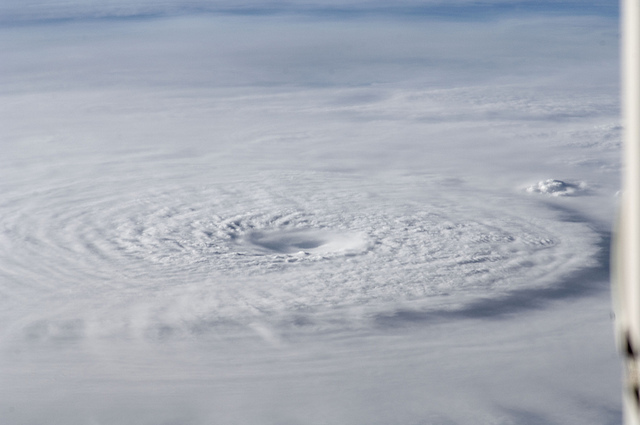Podcast: Play in new window | Download
Subscribe: RSS

Superstorms, such as this 2012 typhoon photographed from the International Space Station, are according to risk analysts the new normal.
More than 1,000 experts on risk, consulted by the World Economic Forum for an upcoming annual meeting, agree that a perfect storm of rising risk, primarily driven by global climate change, and declining economic resilience pose mortal threats to governments, businesses and society in the near future.
The report (read it here) notes that global warming is coming on harder and faster than the worst-case scenarios of just a few years ago. The accelerating impacts, it says, will “likely lead to negative impacts including an increase in the frequency of high-intensity tropical cyclones, inundation of coastal cities as sea levels rise, and increased drought severity in several regions. Together, the effects would not only mean significant economic losses but also mass displacement of populations, rising food insecurity and aggravated water scarcity.”
Meanwhile, the analysts note, the economic impact of the disasters on over-leveraged and out-of-balance economies make it even less likely that the heavy, long-term investments necessary to counter climate change will be made.
Asked to evaluate which risks are most likely to affect the world in the near future, the experts voted:
- Severe income disparity.
- Chronic fiscal imbalances.
- Rising greenhouse gas emissions.
- Water supply crises.
- Mismanagement of population aging.
Asked which of the things likely to happen would have the most impact, they listed:
- Major systemic financial failure.
- Water supply crises.
- Chronic fiscal imbalances.
- Food shortage crises.
- Diffusion of weapons of mass destruction.
Although this report reads likes a synopsis of my book Brace for Impact: Surviving the Crash of the Industrial Age (the second edition of which, in paperback, will be available in a few days), it leaves out some things. Where, for example, is the concern about peak oil? Surely these experts have not bought into the massive hype about fracking bringing on a new age of petroleum plenty in the US, or anywhere?
And how is it that food shortages, while recognized here as having great impact, do not appear on the most-likely list, given the drastic impairment of food production by drought during the past year?
The vulnerability of the power grid is mentioned frequently and urgently, but is given a lower priority than managing aging?
And then , just when we were taking these folks very seriously, and our hair was catching fire, they had to throw in, as a low-probability but high-impact possibility, the discovery of extraterrestrial life. Sigh.